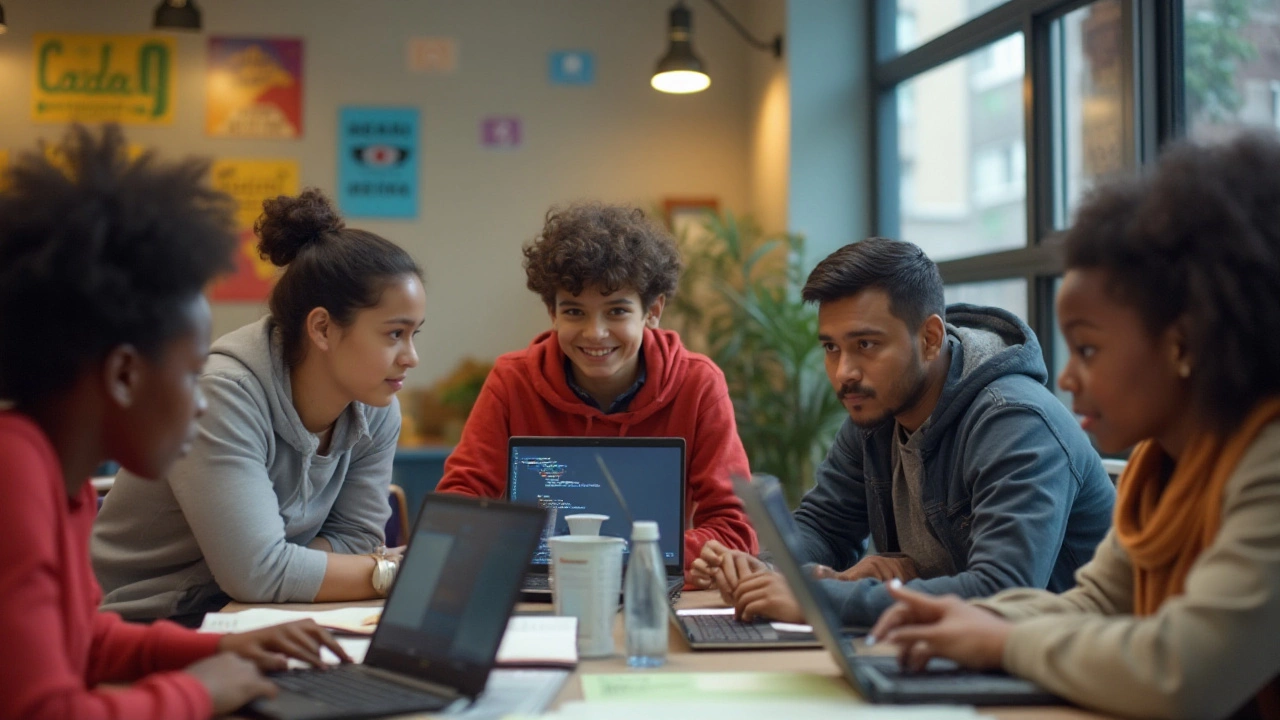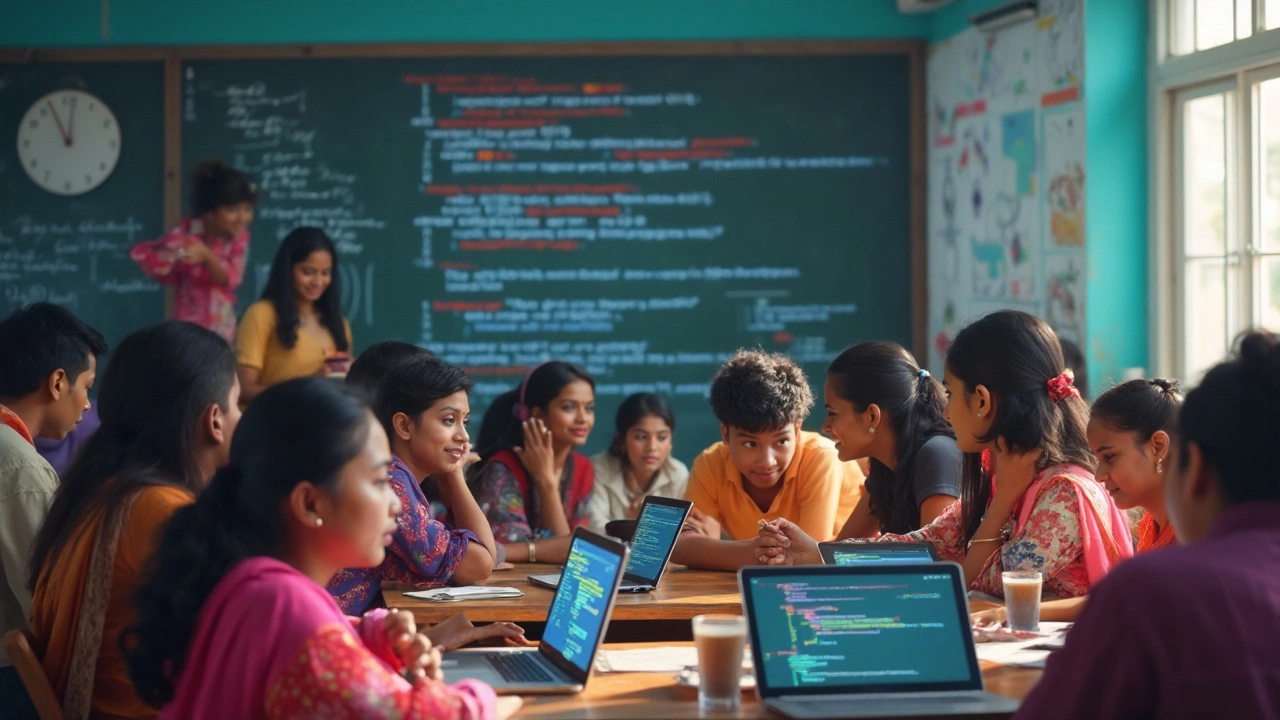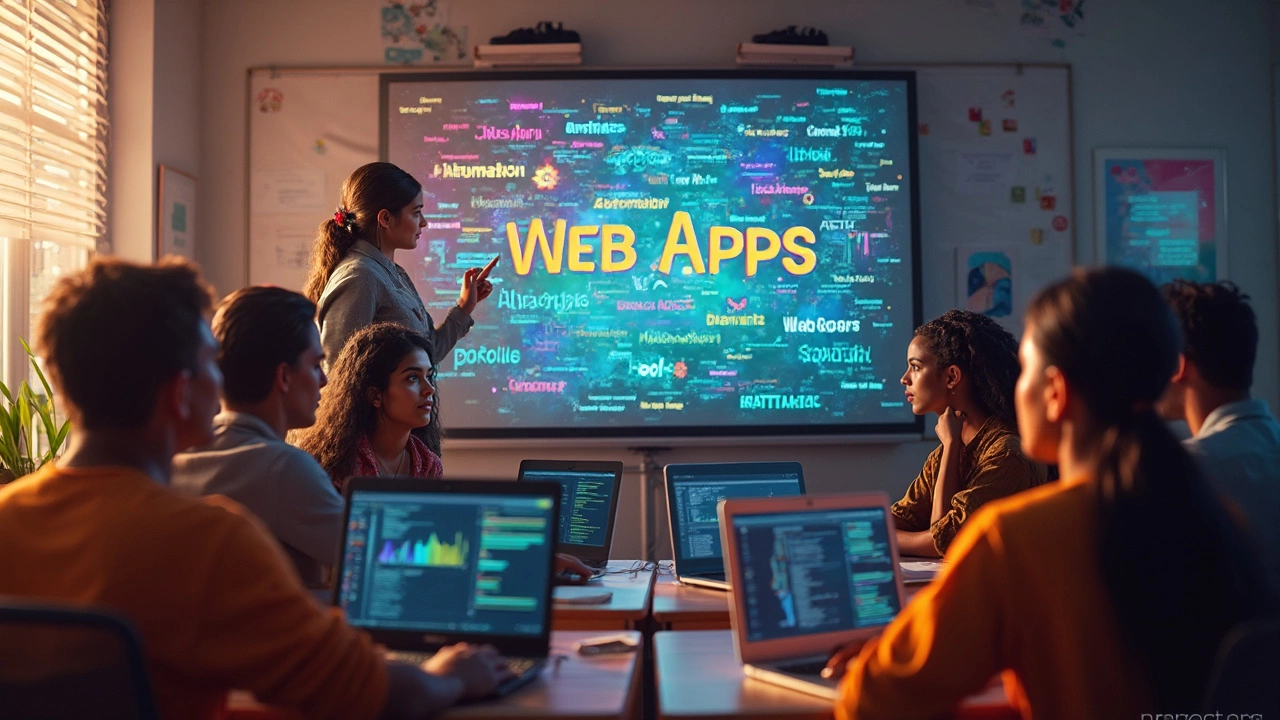Coding may appear daunting at first glance, especially for those just starting out. When beginners embark on the journey into the intricate world of programming, they often encounter a maze of syntax, logic, and vocabulary that can feel overwhelming. But fear not, for every seasoned coder today was once a novice navigating these same waters.
The first step in making coding less intimidating is understanding the nature of its challenges. This article breaks down the complex areas of coding and offers beginner-friendly advice that can ease these initial encounters. From selecting the right language to effective strategies for learning, we will explore practical tips designed to boost confidence and set beginners on the right path.
- Why Coding Seems Challenging
- Choosing Your First Programming Language
- Overcoming Common Obstacles
- Effective Learning Methods
- Interesting Facts About Programmers
- Helpful Resources for Beginners
Why Coding Seems Challenging
Embarking on the journey of learning to code can often feel like diving into an ocean of complex logic, foreign language, and intricate structures. One of the main reasons it appears daunting is the seemingly endless volume of information to grasp. Newcomers might initially feel overwhelmed by technical jargon, unfamiliar syntax, and the variety of programming languages available. Additionally, the abstract nature of coding classes can be difficult to conceptualize because, unlike traditional skills, it's not always tangible or visible in its early stages of learning and practicing.
Moreover, the constantly evolving nature of technology and programming can intimidate those just starting out. The tech world is in an ongoing state of flux, with new languages, frameworks, and tools emerging, which might make learners feel like they're aiming at a moving target. This fluid landscape requires a mindset that embraces continuous learning, which isn't immediately intuitive to everyone. Some may struggle with the problem-solving aspect as coding often requires breaking down large, abstract problems into manageable parts, and beginners might not have had much prior experience in this analytical way of thinking.
Beyond the technical aspects, there's also a psychological barrier to overcome. Many beginners may have preconceived notions about who can become a programmer, influenced by stereotypes that suggest it’s a pursuit for 'geniuses' or 'math whizzes.' In reality, coding is a field open to anyone willing to learn and practice. Understanding that failure and persistence are just part of the process, similar to learning any new skill, is key. For instance, Bill Gates once remarked, "The best way to prepare to be a programmer is to write programs, and to study great programs that other people have written. In my experience, learning to code is about embracing mistakes and showing perseverance."
Interestingly, research shows that around 90% of professional programmers report facing challenges with their code almost daily, illustrating that struggle is not just a beginner's plight. Even experts encounter errors and bugs regularly, highlighting that resilience is an invaluable characteristic in coding. Some industry surveys have indicated that the learning curve in coding can be steep. However, mastering foundational concepts in small, manageable chunks can alleviate these feelings of inadequacy and build confidence in the learner. Beginners are often encouraged to start with an easy-to-understand language like Python, known for its readability and relatively simple syntax, or JavaScript, widely used because of its versatility in web development.
Moreover, many educational tools and resources simplify programming for beginners by offering interactive, hands-on experience through platforms like Codecademy, freeCodeCamp, or Khan Academy. These resources provide structured paths and community support that can transform the solitary experience of coding into a collaborative and enjoyable journey. Engaging in coding communities or finding a study partner may also alleviate some of the challenges by offering a support system and a chance to discuss concepts with peers. These resources, along with a positive mindset, can significantly demystify the challenges perceived in coding, turning it into a rewarding pursuit for anyone willing to dedicate the time and effort.
Choosing Your First Programming Language
Diving into the vast sea of programming languages can feel like standing before a library filled with books written in different dialects. For those at the start of their coding journey, selecting the right language is crucial and yet can be perplexing. Each language comes with its unique features, complexities, and specific use cases. It's essential to match your choice with both your interests and goals. Let's unpack this with an insightful look into a few popular options available for beginners.
Understanding Your Goals
Before anything else, clarify what you want to achieve with coding. Are you fascinated by web development, or do you dream of creating mobile applications? Perhaps you are captivated by data analysis. Each path may lead to a different language. For instance, JavaScript is an indispensable tool for building dynamic web pages, Python has gained accolades in data science due to its simplicity and readability, and Swift is excellent if you're interested in iOS development. Aligning your objectives with the language best suited for the job makes learning more pertinent and rewarding.Ease of Learning
Beginners often seek a language that's user-friendly and not too taxing to learn. Python is renowned for having a syntax that mirrors the English language, which alleviates initial learning stress. Alongside Python, Ruby is another strong contender known for its elegance and straightforward syntax. Both allow newbies to grasp programming concepts without being bogged down by intricate syntax rules. A beginner should focus on languages that help them understand the core logic of programming rather than struggling with unnecessary complexity."Learn the fundamentals of a programming language and you'll gain the keys to unlock innovative solutions," says Paul Lathrop, a veteran developer in the tech industry.
Community and Resources
The size and engagement of a programming language's community can significantly impact your learning. A language backed by a vibrant community means abundant resources such as tutorials, forums, and open-source projects. For instance, Python and JavaScript boast large and lively communities ready to support coding classes newcomers. This broad support network can reduce frustrations and quickly turn obstacles into learning opportunities.Market Demand and Opportunities
Understanding the current market trends isn't just insightful; it’s practical when choosing a new language to learn. Presently, Python, JavaScript, and Java continue to present healthy demand across industries. Reports from developer platforms like GitHub and Stack Overflow highlight which languages are increasing in use, shedding light on potential career pathways. Making a choice aligned with market demand can open up numerous career opportunities down the line. Below is a snapshot of popular language trends:| Language | Applications | Popularity (2024) |
|---|---|---|
| Python | Data Analysis, AI | High |
| JavaScript | Web Development | Very High |
| Java | Enterprise, Mobile Apps | High |
Selecting your first programming language is a personal journey. There's no singular correct answer, but rather a best fit for your individual ambitions and the current state of the tech landscape. By considering your goals, seeking ease of learning, leveraging community support, and staying informed about industry trends, you'll be all set to take the first bold step in your coding adventure.

Overcoming Common Obstacles
Embarking on the path to becoming proficient in coding can be a formidable challenge, but understanding these obstacles is the first step in learning how to overcome them. A common stumbling block many beginners face is the overwhelming breadth of programming concepts, from algorithms and data structures to object-oriented programming. It's easy to feel lost in a sea of technical jargon and sophisticated logic that initially makes little sense. To combat this, setting small, achievable goals can help break down the complexity into manageable parts. This approach not only helps maintain motivation but also provides a sense of accomplishment as learners progress.
Another significant hurdle is the disconnect between theory and practice. Learners often consume extensive materials, whether books or online tutorials, only to find themselves stumped when trying to apply this knowledge to real-world problems. A good strategy is to complement theory with projects early on. Engaging in simple, hands-on projects facilitates deeper understanding and retention, as it allows coders to see the tangible results of their efforts. Group projects and coding bootcamps can also provide collaborative learning experiences that add context to abstract concepts.
"The best way to predict the future is to invent it." – Alan Kay, a pioneer in computer science.
Motivation can wane when faced with persistent bugs and errors in code. Errors are part of the learning curve, and understanding that even seasoned programmers encounter challenges can be reassuring. The key is developing a methodical approach to debugging, often turning it into a puzzle-solving exercise. Utilize debugging tools, community forums, and code reviews to gain insights into mistakes and improve problem-solving skills. Moreover, keep debugging logs to track errors and solutions, which can become invaluable resources for future reference.
Coding classes tailored for beginners frequently address these common dilemmas through mentorship and structured learning paths. Having access to guidance and a community of learners can significantly reduce the sense of isolation many feel in self-study. Such classes often use interactive lessons to keep students engaged, ensuring that no one is left behind. They emphasize regular feedback and practice, which are crucial in solidifying new skills and building confidence. Investing time in these environments can accelerate the learning process even amidst the obstacles one might face in mastering programming.
Remember, persistence is a cornerstone of learning to code. It's a journey filled with constant learning and adaptation, and the rewards of persistence are substantial. Whether you're debugging, applying your knowledge through projects, or leaning on a community for support, every step taken is a step towards mastery. Embrace the process with an open mind, and let each obstacle become a stepping stone to greater understanding and skill. Coding might be challenging, but with the right strategies and mindset, getting past common hurdles is not only possible, it's inevitable.
Effective Learning Methods
Embarking on the journey of learning how to code is like opening a treasure chest of opportunities, yet it demands resilience, determination, and clever strategies. A successful learning path, however, doesn't just rely on effort; it's also deeply intertwined with methods and approaches that cater to a beginner’s needs. One method for jumping into programming is starting with project-based learning, where learners focus on building tangible projects. This not only enhances coding skills but also instills a sense of accomplishment. Embracing this method introduces learners to real-world applications, making the learning process relevant and immersive.
Another brilliant strategy is to start with simple languages like Python, which is renowned for its readability and concise syntax. Python acts as a comfortable stepping stone, easing learners into the often complex world of coding. Known for its vast community support and numerous resources, anyone venturing into coding classes will find themselves surrounded by a wealth of knowledge and guidance. Interestingly, Python’s versatility extends to domains like web development, data analysis, and artificial intelligence, making it a practical choice for various career paths.
Online courses and tutorials have transformed how beginners approach coding. With platforms like Codecademy, Khan Academy, and freeCodeCamp, learning is just a click away. These platforms offer structured curriculums that allow beginners to learn at their own pace, blending video tutorials with interactive challenges to reinforce concepts. It's vital, however, to complement these courses with practice—lots of it. As the saying goes, “Practice makes perfect,” this axiom holds particularly true in coding. Regular practice ensures that learners transition concepts from theoretical understanding to practical application, bolstering their confidence and skill level.
Steve Jobs once said, “Everyone should learn how to program a computer because it teaches you how to think.” This ethos captures the transformative power of coding as a tool for logical and innovative thinking. By immersing themselves in coding, beginners learn more than just syntax or structures; they develop problem-solving skills that are applicable across various fields.
Additionally, connecting with a community of fellow learners can significantly impact one’s coding journey. Websites like Stack Overflow or GitHub not only provide solutions but also offer a sense of belonging, where learners can share their successes, struggles, and insights. Attending local meetups or joining coding bootcamps can further enhance one’s learning process. These gatherings help foster connections with like-minded individuals, making the sometimes-lonely journey of learning to code a more collective and enjoyable experience. Providing an immersive environment, these meetings allow you to engage in teamwork and collaboration, equipping you with a skill set that’s highly valued in today's tech-centric job market.
Furthermore, applying a mix of different learning styles such as visual, auditory, and kinesthetic can cater to personal preferences and improve retention. Watching tutorials or listening to podcasts can sometimes make learning more relatable and easier to grasp. Building tools and programming projects foster a hands-on approach which is essential when studying the dynamic landscape of coding.
Learning to code isn't merely about mastering a language; it's about developing a mindset open to continual learning and exploration. The process is filled with rewards, challenges, and a plethora of growth opportunities ripe for the taking.

Interesting Facts About Programmers
Let's dive into the fascinating world of programmers and uncover some intriguing facts about this group of digital creators. Programmers are the architects of the digital age, shaping the landscape of technology as we know it. Did you know that the first programmer in history was a woman? Ada Lovelace, an English mathematician, is credited with creating the first algorithm intended for a machine, despite computers not even existing in her time. This pioneering work laid the groundwork for what we now call coding. In the diverse field of programming, this legacy continues as a testament to the vital contributions from all corners of society.
Another captivating aspect of programming is the sheer number of languages available to learn. There are currently over 700 programming languages, each with unique features and applications. The most popular ones you may have heard of include Python, Java, and C++. These languages are the tools of the trade for coders, allowing them to create everything from complex software applications to simple scripts that automate everyday tasks. The choice of language often depends on the specific needs of a project, showcasing the adaptability and problem-solving skills inherent to programmers.
Programmers are not just about coding in isolation; they are part of a larger community that values collaboration and open-source ideals. Open source platforms, such as GitHub, provide a space where programmers can share their projects with the world. This culture of sharing has led to an explosion of innovative software solutions and new opportunities for budding developers. Remarkable contributions like the Linux operating system are the direct result of this collaborative environment, with developers worldwide pitching in to enhance and refine the product.
It's also worth noting the impressive earning potential in the field of programming. According to industry data, coders are among the highest-paid professionals in tech, with salaries often surpassing those in other fields. This financial boon, coupled with the increasing demand for skilled programmers, makes it an attractive career option for many. New technologies continuously emerge, which present programmers with both challenges and opportunities to expand their skill sets and advance their careers. The career path of a programmer is characterized by continual growth and learning as technology evolves.
"Programs must be written for people to read, and only incidentally for machines to execute." — Harold Abelson
Finally, let's debunk a common stereotype: not all programmers are introverted math geniuses. There's a significant amount of creativity involved in coding. Creating a program that is both efficient and user-friendly requires innovative thinking and a bit of artistic flair. Programmers often describe their work as a form of digital art, where every line of code contributes to the overall aesthetic and functionality of their creations. So, whether you're considering a career in programming or simply fascinated by the inner workings of our digital world, remember that at the heart of every piece of technology, there's a programmer who brought it to life.
Helpful Resources for Beginners
Embarking on a journey to learn programming for beginners can be a thrilling yet overwhelming experience. The ocean of resources available might seem daunting, but you’ll find a treasure trove of information if you know where to look. First off, online platforms like Coursera, Udemy, and edX offer structured courses tailored specifically for those who are new to the art of coding. These platforms provide interactive lessons that cover different programming languages such as Python, JavaScript, and Ruby, helping you to get started with the basics. They often include quizzes and projects which are designed to help reinforce the concepts you've just learned, allowing you to practice in a real world-like environment. A lot of these courses are curated by top universities and industry leaders, ensuring you get quality instruction.
For a more community-driven approach, platforms like Stack Overflow and GitHub host enormous amounts of discussions and open-source projects. Beginners can benefit greatly from these platforms as they allow you to see how problems are solved in the real tech world. You can ask questions and often get insights from experienced developers who are more than willing to share their expertise. Speaking of community support, forums like Reddit's learnprogramming and Codecademy’s community board offer a less formal but equally valuable type of interaction where you can discuss tips and challenges with peers and experts in the field.
Additionally, there is a smorgasbord of free resources available, such as Khan Academy and FreeCodeCamp. They provide coding classes that require nothing more than your dedication and time. As the founder of FreeCodeCamp, Quincy Larson, once said,
"The beauty of self-paced learning is that you get to control the pace. You’re rewarded with mastery, not certificates."This philosophy has propelled many to successfully shift into coding careers, emphasizing the importance of consistent practice without the constraints of formal classes.
If you prefer print over screen, numerous books cater specifically to beginners. Titles like "Automate the Boring Stuff with Python" by Al Sweigart and "HTML and CSS: Design and Build Websites" by Jon Duckett are great starting points. These books break down complex topics into manageable chunks, often coupling detailed explanations with exercises. This approach is excellent for those who prefer to learn at their own leisure, away from an interactive screen.
Podcasts such as "Code Newbie" and "Learn to Code with Me" keep learning fresh and engaging. These auditory resources offer you insights and interviews with industry experts, motivational stories from other newcomers, and coverage of the latest trends in the tech space. On your commute or during your downtime, podcasts can serve as a friendly reminder of the broader world of technology you're about to enter.
If statistical data appeals to you, consider noting that according to a survey by Stack Overflow, around 60% of professional developers report being self-taught, having utilized many of the resources mentioned here. This statistic highlights the accessibility of learning materials and underscores the importance of harnessing them effectively. To make optimal use of these resources, creating a structured learning plan can help immensely. Begin by identifying your goals, such as building a specific project or gaining proficiency in a particular language, and then choose the resources that align most closely with those objectives.



